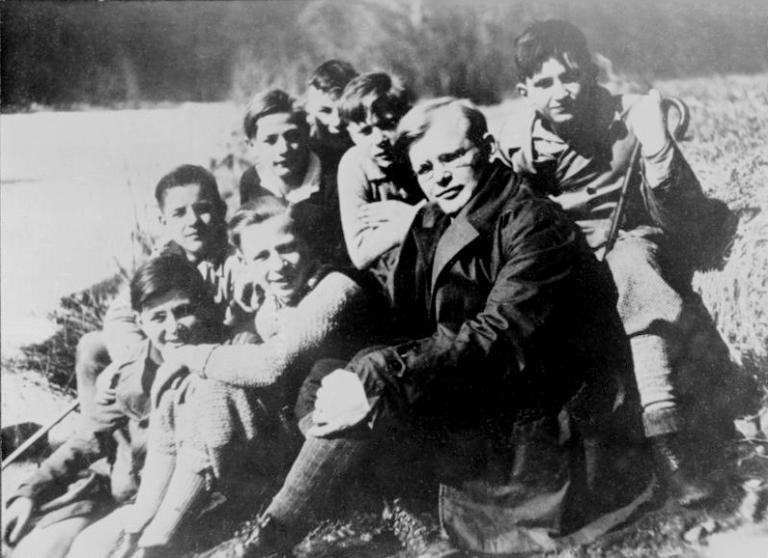
Larry Rasmussen’s brief essay on the reception of Bonhoeffer in the United States is quite telling. While anecdotal, his reflections on the widespread interest in Bonhoeffer during his tenure at Union Theological Seminary conveys the sense that there is a bit of something for everyone to find appealing in Bonhoeffer.
Feminist students were drawn to Bonhoeffer’s emphases on sociality and solidarity in his theological ethics, while struggling with his apparent patriarchal reflections. African Americans resonated with him as a white European male theologian who believed he had something to learn from African American people and their culture. The social justice group was struck by Bonhoeffer’s theo-political struggle in the church and involvement in the conspiracy against Hitler. Korean and South African students who came from the ranks of those involved in government opposition were drawn to Bonhoeffer’s faith-based resistance, speaking truth to power. The Catholics and high church Protestants were enamored with Bonhoeffer’s robust affirmation of the church in Sanctorum Communio. The evangelical students cherished Bonhoeffer’s robust Christology and “close Christian community over against the wider world as a disciplined faith-based alternative to it.” Texts that spoke to Evangelical students were Discipleship and Life Together, whereas Letters and Papers as well as Ethics spoke to the social justice cohort. It should not be surprising that disparate groups can find different works of Bonhoeffer compelling, as the texts themselves “are highly disparate texts,” according to Rasmussen. “Letters and Papers from Prison, and Ethics, are not Life Together and Discipleship.”[1]
Rasmussen does not specify what kind of evangelicals he had as students at Union. Perhaps they represented more the Anabaptist line with their profound emphasis on robust Christian community. Regardless, in my own experience, evangelicals are enamored with Bonhoeffer’s piety centered in Jesus in the company of his disciples. Thus, Discipleship and Life Together are noteworthy texts in our tradition. Less familiar and even troubling to many in my experience is Bonhoeffer’s Letters and Papers from Prison. While anecdotal, as with Rasmussen’s reflections, I have found my seminary students quite affirming of Discipleship, responsive to Life Together, and often disturbed over Letters and Papers. An Evangelical publisher even tried to get me to remove from a book I wrote a quotation from Letters and Papers that the only God who exists with and for us today is the God-forsaken/God-forsaking God on the cross.[2]
If Rasmussen’s anecdotal portrayal of Bonhoeffer is accurate, there is something of a Bonhoeffer pluralism. Perhaps it is best to speak of “Bonhoeffers” rather than “Bonhoeffer,” or that there are various disparate dimensions, and that one cannot make a case for Bonhoeffer as fundamentally a feminist, a social justice devotee, a high churchman, a proponent of Black theology, a political revolutionary, or an evangelical. He is simply Bonhoeffer with emphases that resonate with all these admirers, but that can also rub them the wrong way. Many are more certain of Bonhoeffer than he was of himself. He always clung to the righteousness of Christ rather than to his own merits, in good Lutheran fashion. His poem “Who Am I?” in Letters and Papers from Prison,[3] while written during a time of great spiritual and psychological duress, might nonetheless lead to greater circumspection on the part of Bonhoeffer’s interpretive interlocuters today as to who the real Bonhoeffer was. Bonhoeffer himself wondered.
____________________
[1]Larry Rasmussen, “Bonhoeffer and Public Ethics in the USA,” in Interpreting Bonhoeffer: Historical Perspectives, Emerging Issues, ed. Clifford J. Green and Guy C. Carter, eds. (Minneapolis: Fortress Press, 2013), page 36.
[2]Dietrich Bonhoeffer, Letters and Papers from Prison, ed. John W. DeGruchy, Dietrich Bonhoeffer Works, vol. 8 (Minneapolis: Fortress Press, 2009), pages 478-479.
[3]Bonhoeffer, Letters and Papers from Prison, vol. 8, pages 459-460.












